五升六英语知识要点
【提优拔尖】小学英语五升六暑假讲义专题二 ---- 现在进行时和一般现在时总结

暑期专题二----- 现在进行时和一般现在时的总结一般现在时用法详解定义:A. 自然规律。
(Eg: the earth goes around the sun.)B. 主语和with词组并列时,遵循就远原则。
(Eg:She with her friends goes swimming every day.)C. 按照计划,规定或者时间表行事。
(The plane takes off at 6 p. m.)D. 当主语是who; which; what等;将其看成第三人称单数。
(Who makes the room messy?)时间标志词:1. every 系列 2. 频率副词 3. On Sundays(表示每一个星期日)其中频率副词可分为模糊频率副词和精确频率副词模糊频率副词:always; usually; often; seldom; hardly; never精确频率副词:twice a week; once a week; three times a week对频率副词提问: How often对次数提问:How many times肯定结构:1. 主语+ am/ is /are + 其他2. 主语+ 实意动词(注意第三人称单数)+ 其他否定结构:1. 主语+ am/ is /are + not + 其他2. 主语+ don’t实意动词原型+ 其他3. 主语+ doesn’t实意动词原型+ 其他一般疑问结构:1. Am/is/are + 主语+ 其他?2. Does/ Do + 主语+ 动词原形+ 其他?拓展知识点:1. 按照计划,规定或者时间表行事。
(The plane takes off at 6 p. m.)2. 区分祈使句和一般现在时句型(Eg: 祈使句:Bobby, don’t be sad. 一般现在时:Bobby isn’t sad.)现在进行时详解定义:表示说话时正在进行的动作,强调“此时此刻”,常和now, look, listen连用。
五升六语法翻译知识点

一、词类:1、名词这里强调两点:不可数名词都默认为单数,所以总是用is名词复数如何加后缀:2、人称代词和物主代词人称代词:有主格和宾格之分。
一般动词前用主格,动词后用宾格。
3、指示代词4、冠词a、a n、thea和an的区别:an用于元音音素(一般就是元音字母a、e、i、o、u)前,,a用于辅音音素前。
二、否定句:be动词(am、is、are)+not情态动词can+ not助动词(do、does)+ not如何将一个肯定的陈述句改为否定句1、看句中有无be动词,如有,直接在be动词后+ not。
2、看句中有无情态动词,如有,直接在情态动词后+ not。
3、如上述二者都没有,就应用助动词+ not。
分四个步骤:(1)肯定陈述句中本来是没有助动词的,要加上去,位置在主语(某人或某物)后,动词前。
(2)确定助动词用do、does,根据句中动词,动词是原形的助动词就用do,动词是第三人称单数的助动词就用does,(3)在助动词后加not。
(4)原句中动词假如发生变化就要恢复成原形。
强调一点,有some的要考虑是否要用any。
三、一般疑问句。
如何将一个肯定的陈述句改为一般疑问句:1、看句中有无be动词,如有,把be动词提到句首即可。
2、看句中有无情态动词,如有,把情态动词提到句首即可。
3、如上述二者都没有,就应把助动提到句首。
分四个步骤:(1)肯定陈述句中本来是没有助动词的,要加上去,位置在主语(某人或某物)后,动词前。
(2)确定助动词用do还是does,根据句中动词,动词是原形的助动词就用do,动词是第三人称单数的助动词就用does(3)把助动词后提到句首。
(4)原句中动词假如发生变化就要恢复成原形。
强调一点,有some的要考虑是否要用any。
四、特殊疑问句。
表示疑问,有疑问词(在开头),回答有很多种可能。
常用疑问词:五、时态1、一般现在时(1)一般现在时中的be动词:一般用原形:am、is 、aream用于第一人称单数(I);is用于第三人称单数(he 、she 、it和其他人名或称谓,如:Ben 、his 、sister等);are用于第二人称单数(y ou)和所有复数(包括第一人称复数we、第二人称复数y ou;第三人称复数they和其他复数,如the children 、 his 、parents等)。
【提优拔尖】小学英语五升六暑假讲义专题三 ---- 一般过去时(一)
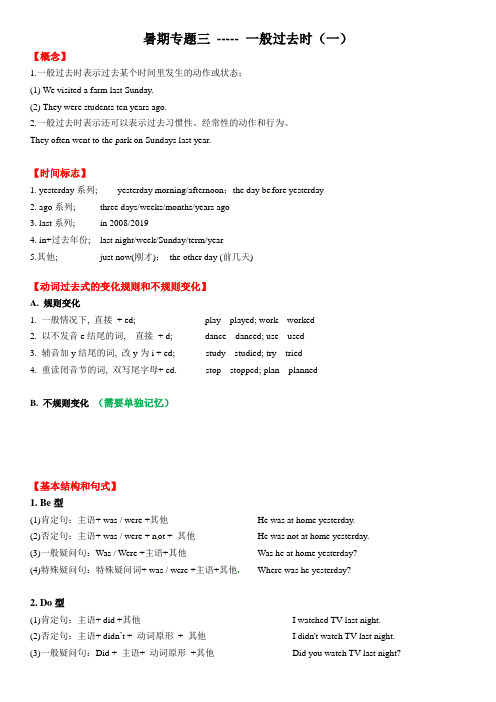
暑期专题三----- 一般过去时(一)【概念】1.一般过去时表示过去某个时间里发生的动作或状态;(1) We visited a farm last Sunday.(2) They were students ten years ago.2.一般过去时表示还可以表示过去习惯性、经常性的动作和行为。
They often went to the park on Sundays last year.【时间标志】1. yesterday系列; yesterday morning/afternoon;the day be fore yesterday2. ago系列; three days/weeks/months/years ago3. last系列; in 2008/20194. in+过去年份; last night/week/Sunday/term/year5.其他; just now(刚才);the other day (前几天)【动词过去式的变化规则和不规则变化】A. 规则变化1. 一般情况下, 直接+ ed; play---played; work---worked2. 以不发音e结尾的词, 直接+ d; dance---danced; use---used3. 辅音加y结尾的词, 改y为i + ed; study---studied; try---tried4. 重读闭音节的词, 双写尾字母+ ed. stop---stopped; plan---plannedB. 不规则变化(需要单独记忆)【基本结构和句式】1. Be型(1)肯定句:主语+ was / were +其他He was at home yesterday.(2)否定句:主语+ was / were + n ot + 其他He was not at home yesterday.(3)一般疑问句:Was / Were +主语+其他Was he at home yesterday?(4)特殊疑问句:特殊疑问词+ was / were +主语+其他Where was he yesterday?2. Do型(1)肯定句:主语+ did +其他I watched TV last night.(2)否定句:主语+ didn’t + 动词原形+ 其他I didn't watch TV last night.(3)一般疑问句:Did + 主语+ 动词原形+其他Did you watch TV last night?(4)特殊疑问句:特殊疑问词+ did + 主语+动词原形+其他What did you do last night?一般过去时专项练习一、写出下列动词的过去式1.am/is ______2. cry________3. read ________4. watch ________5. live _________6. take ________7. spend________8. drink_________9. fly________ 10.ride _______ 11.live _________ 12. give________13. do _______ 14. go ________ 15. have _______ 16 .cook_______17. cut ________ 18. clean _______ 19. think _______ 20. study_________二、用括号内所给词的适当形式填空1. We _________ (enjoy) ourselves at the party last night.2. The teacher told us that the moon_____(travel) around the earth.3. _______ you ______ (go) to the Great Wall last year?4. The old man _______(be)ill and went to see a doctor.5. We ________ (have) a party next Sunday.6. They _________(play) the guitar now.7. Did she ________ (have) supper at home?8. Jack ____________ (not clean) the room just now.9. _________ (be) it cold in your city yesterday?10. How many people ________ (be) there in your class last term?11. It ________ (be) hot yesterday and most children _______ (be) outside.12. There ________ (be) a football match on TV yesterday evening, but I _________ (have) no time to watch it.13. He ate some bread and _________ (drink) some milk.14. ________ he __________ (finish) his homewo rk last night?15. I__________(be) tired yesterday.16. I ___________(gain ) Arts degree last year.17. What _________ you ___________ (do) last night?18. My grandfather _________ (leave) Hong Kong for New York in 1998.19. What _______ he ________ (do) yesterday?20. Last week I _______ (buy) a new bike.21. He ________ (be) here just now.22. He __________ (not find ) his key last night.24. My father __________ (drink) a lot of wine yesterday.24. ________ you ________ (finish) your homework yesterday?25. Her mother __________ (not give) the girl any present.三、句型转换1. He came here last month. (改为否定句)He ______ ________ here last month.2. They played football this morning. (改为一般疑问句并作简略回答)—______ they _______ football this morning?—Yes, they _______./No, they _________ .3. They went to Beijing last year. (就划线部分提问)_________ _________ they ________ last year.4. Tom watched TV last night. (改为一般疑问句)_______ Tom _______ TV last night?5. Mary does homework every day. (用last night 改写句子)Mary ______ ________ ________ __________ .6. My family went to the beach last week. (划线提问)________ ________ ________ family _______ last week?7. I didn’t hav e any friends. (一般疑问句)________ _______ have _______ friends?8. She had many books in the room. (一般疑问句)________ she _________ many books in the room?9. Sally often did some reading in the morning. (否定句)Sally _______ often ______ some reading in the morning.10. She read some books in the room. (否定句)She __________ __________ ________ books in the room.四、改错题1. How is Jane yesterday? _______________________2. He go to school by bus last week. _______________________3. He often goes home at 6:00 last month. _______________________4. I can fly kites seven years ago. _______________________5. Did you saw him just now. _______________________6. Tom wasn’t watch TV last night. _______________________7. I didn’t my homework yesterday. _______________________8. He wait for you three hours ago. _______________________9. Who find it just now ? _______________________10. What did he last week? _______________________五、选择填空( ) 1. Lee ________ his mobile phone at home.A. leaveB. leavesC. leavedD. left( ) 2. _____ he ________ a good rest? No, he didn’t.A. Do, hadB. Did, haveC. Did, hadD. Was, had( ) 3. As soon as he ________, he ______ to his family.A. arrived, writesB. arrived, writtenC. arrive d, wroteD. arriveds, write ( ) 4. Mr. Black was late because he _______ his way.A. lostedB. loseC. losesD. lost( ) 5. When _________ Lee ________ school this morning?A. did, got toB. did, get toC. did, getD. did, got( ) 6. Will you please say it again? I ________ quite _______ you.A. didn’t, hearB. don’t, heardC. didn’t, heardD. don’t, hear ( ) 7. ______ you ________ at six o’clock yesterday?A. Do ,get upB. Did, get upC. Do, got upD. Did, got up( ) 8.What did you see _________?A. nowB. every dayC. these daysD. just now( ) 9.He went into the room and _______ the door.A. lockB. lockingC. locksD. locked( ) 10. —What _____ you _______ last week? —I bought a bag.A. did ,buyB. did , boughtC. do, buyD. do, bought( ) 11. —_____ he ____ his lunch? — Yes, he did.A. Does ,hasB. Does, haveC. Did, haveD. Did, had( )12.—Did the thieves _____ into the car? —No, they______.A. fell, didn’tB. fall(落下), didC. jump(跳), didn’tD. jump, did ( ) 13. -When did May come back from Hong Kong? -She __ from Hong Kong last Friday. A. come back B. comes back C. returned back D. came back ( ) 14. ____ she _____ this dictionary in the bookshop nearby last week?A. Did, buyB. Does, buyC. Did, boughtD. Does, buys ( ) 15. He ____ to the station this morning and was______ for the train.A. hurry, in timeB. hurries, on timeC. hurried, in timeD. hurried, at time ( ) 16. Where _____ Uncle Sun yesterday?A. wasB. wereC. didD. does ( ) 17. —Have you seen him today? —Yes, I ____ him this morning.A. seeingB. seeC. seesD. saw( ) 18. He ______ worried when he heard the news.A. isB. wasC. doesD. did( ) 19. There _____ a telephone call for my brother Steven yesterday?A. isB. areC. wasD. were( ) 20. Liu Fengwei _____ three yuan for the lost library book.A. paidB. payC. spentD. lost( ) 21. He ____ in this school in 1958.A. taughtB. teachC. teachesD. teaching( ) 22. They _____ tired so they stopped ____ a rest.A. are, haveB. were, haveC. were, to haveD. are, hav ing( ) 23. Yesterday I _____ in bed all day because I had a fever.A. layB. lieC. laidD. lied( ) 24. It was raining hard when he ____ home.A. gotB. getC. getsD. was getting( ) 25. She said her brother ____ in Beijing. He ______ to Japan on business last week.A. wasn’t, wentB. hasn’t, wentC. wasn’t, goD. isn’t, went一般过去时专项练习答案一、写出下列动词的过去式(略)二、用括号内所给词的适当形式填空1. enjoyed2. travels3. Did; go4. was5. will have6. are playing7. have8. didn’t clean9. Was 10. were11. was; were 12. was; had 13. drank 14. Did finish 15. was16. gained 17. did do 18. left 19. did do 20. bought21. was 22. didn’t find 24. drank 24.Did finish 25. didn’t give三、句型转换1. didn’t come2. Did play ; did; didn’t3. Where did go4. Did watch5. did homework last night6. Where did your go7. Didn’t you have8. Did have9. didn’t do 10. didn’t read any四、改错题1. is --- was2. go ---- went3. goes---- went4. can ---- could5. saw---- see6. wasn’t ---- didn’t7. didn’t --- didn’t do8. wait --- waited9. find --- found 10. he ---- he do五、选择填空DBCDB ABDDA CCDAC ADBCA ACAAA。
五升六年级英语暑假《常用口语》归纳

1. ----What's your name? 你叫什么名字?----My name is ________我叫……2.----How old are you? 你几岁了?----I'm 12. 我十二岁。
1. ----What colour is it? 它是什么颜色的?----It's yellow and white. 黄白相间。
2. ----What colour are they? 它们是什么颜色的?----They're green. 绿色的。
1. ----What time is it now? 现在几点钟?----It's nine o'clock,It's time for English class.九点。
该上英语课了。
2. ----When is your birthday? 你的生日是什么时候?----It’s October 1st, our National Day.十月一日国庆节。
1. ----Where is my toy car? 我的玩具汽车在哪儿?----It's here, under the chair. 在这儿.在椅子下面。
2. ----Where is the canteen? 餐厅在哪儿?----It's on the first floor. 在一楼。
1. ----How many kites can you see? 你可以看见几只风筝?----I can see 12. 我可以看见十二只风筝。
2. ----How much is this dress? 这条连衣裙多少钱?----It's ninety-nine yuan. 九十九元。
1. ----How tall are you? 你有多高?----I’m 160 cm tall. I'm taller than you.我有160公分。
最新小学英语五升六授课内容整理
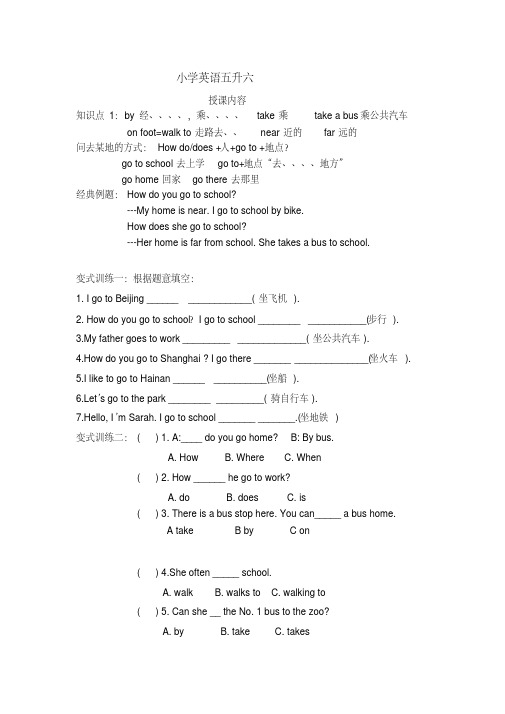
小学英语五升六授课内容知识点1:by 经、、、、,乘、、、、take 乘take a bus 乘公共汽车on foot=walk to走路去、、near 近的far远的问去某地的方式:How do/does +人+go to +地点?go to school 去上学go to+地点“去、、、、地方”go home 回家go there 去那里经典例题:How do you go to school?---My home is near. I go to school by bike.How does she go to school?---Her home is far from school. She takes a bus to school.变式训练一:根据题意填空:1. I go to Beijing ______ ____________( 坐飞机).2. How do you go to school?I go to school ________ ___________(步行).3.My father goes to work _________ _____________( 坐公共汽车).4.How do you go to Shanghai ? I go there _______ ______________(坐火车).5.I like to go to Hainan ______ __________(坐船).6.Let’s go to the park ________ _________( 骑自行车).7.Hello, I’m Sarah. I go to school _______ _______.( 坐地铁)变式训练二:( ) 1. A:____ do you go home? B: By bus.A. HowB. WhereC. When( ) 2. How ______ he go to work?A. doB. doesC. is( ) 3. There is a bus stop here. You can_____ a bus home.A takeB byC on( ) 4.She often _____ school.A. walkB. walks toC. walking to( ) 5. Can she __ the No. 1 bus to the zoo?A. byB. takeC. takes( ) 6. How does she go _______ there?A. toB./C. over( ) 7. My home is _____ our school. I can go on foot.A. not farB. nearC. far from变式训练三:根据句子意思,填上正确的单词。
五升六暑期英语教案第01课时 --特殊疑问词

授课老师:李老师本课主题:疑问词用法(特殊疑问句)【模块一:图文内容】【模块一:此课知识】疑问词第一节1.疑问词:what, who, where, how, when, why…2.用途:特殊疑问句是在英语中以特殊疑问词开头,对句子的某一成分进行提问,具体的人或事、时间、地点、原因等。
(不能用yes或no来回答)3.结构:特殊疑问词 + 一般疑问句【特殊疑问词+be/助动词/情态动词+主语+谓语】4.(1)What,”什么”,用于询问是什么、叫什么、做什么等。
What is your name?①What time 询问时间 What time is it? 几点了?②What color 什么颜色 What color is your book? 你的书是什么颜色?③What about 询问意见 What about this dress? 这条裙子怎么样?④What day 星期几 What day is it today? 今天星期几?(2)How,”怎么样”,询问状况(身体)①How old 几岁(年龄) How old are you? 你几岁了?②How long 多长(长度)How long is your pencil? 你的铅笔多长?③How many 多少(数量)How many apples do you have? 你有多少苹果?④How much 多少钱(价格)How mush is it? 这个多少钱?⑤How about 怎么样(意见)How about this dress? 这条裙子怎么样?(3)When 什么时候(时间)When do yo get up? 你什么时候起床?(4)Where 哪里(地点)Where is my ruler? 我的尺子在哪儿?(5)Who 谁(人)Who are you? 你是谁?(6)Which 哪一个Which season do you like best? 你最喜欢哪个季节?(7)Why 为什么(原因)Why do you like spring? 你为什么喜欢春天?(8)Whose 谁的(问主人)Whose is this book? 这是谁的书?练习检测1.连线When 谁What about 颜色Where 什么时候What day 星期几Who 谁的What time 意见Whose 怎样What color 几点What 为什么How about 年龄Which 哪里How long 多少钱Why 什么How old 多长How 哪一个How much 数量How many2.用疑问词填空1)____is Zhaoxin? 赵信在哪里?2)____do we play computer games again?我们什么时候在玩电脑游戏?3)____to gank Lebranc?怎么偷袭乐芙兰啊?4)____is the red buff or blue buff? 什么是红buff或者蓝buff?5)_____ is that ugly girl? 那个丑女孩是谁?6)_____ is my father? 我的父亲在哪里?7)______ are Jack and Tom? They are behind you.8)_______ do you go to school? I go to school by bike.9)______ ________ is a flower? It is 4 yuan each.10)________ are they? They are my teachers.11)________ are you going? We are going to the bakery.(面包坊) 12)________ does he jog? He jogs in the park.13)______ _______ is it? It is nine o’clock.14)______ _______ does your mother get up? My mother get s up at 6:30.15)______ _______is it? It is purple.16)______ _______ is your coat? My coat is black.17)______ _______ is today? Today is Monday.3.连线:(Match)What’s on the chair? There is a book in the ba g.How is your father? These are apples. What are these? I go to scho ol by bus.What is in the bag? The radio is on the chair.How do you go to school? My father is fine.How much is it? I wash my f ace in the morning.What time is it? I have two hands.When do you wash your face? It is four o’clock.How many hands do you have? It is 5 RMB(人民币). When do you have lunch? I have lunch at noon.4.对画线部分提问例,I am from China. -- Where are you from﹖They are my teachers. -- Who are they?(1)Her sweater is (red). ______ ______ is her sweater?(2)There are (fifty) students in my class.______ ______ students are there in your class?1)She is a nurse . ______ is she?2)She is my teacher. _______ is she?3)It is my coat . ________ coat is it?4)I am looking for my sister .5)I get up at six .6)I am from Hubei . _______________________________________7)I am late. __________________________________8)It is purple. __________________________________9)It is nine o’clock. __________________________________10)It is 4 yuan.__________________________________11)I go to school by bus. _________________________________12)Today is Monday. _________________________________13)My father is fine._________________________________14)There are three apples._________________________________15)She is thirteen years old. _________________________________16)This pen is mine. _________________________________。
【提优拔尖】小学英语五升六暑假讲义专题十 ---- 情态动词can may must的用法
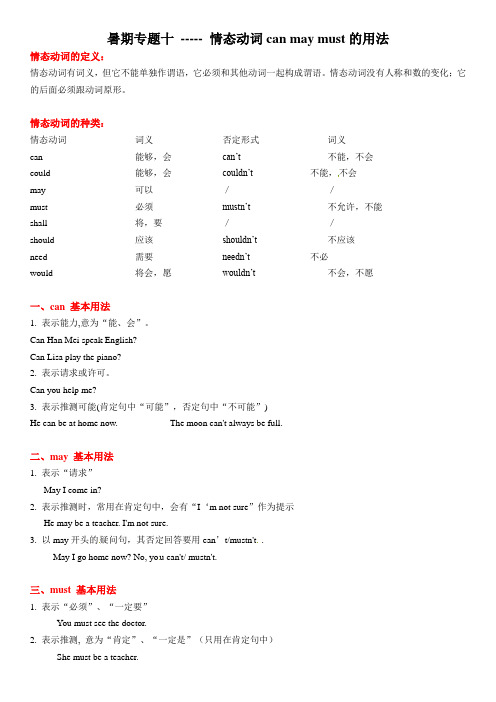
暑期专题十----- 情态动词can may must的用法情态动词的定义:情态动词有词义,但它不能单独作谓语,它必须和其他动词一起构成谓语。
情态动词没有人称和数的变化;它的后面必须跟动词原形。
情态动词的种类:情态动词词义否定形式词义can 能够,会can’t 不能,不会could 能够,会couldn’t 不能,不会may 可以//must 必须mustn’t 不允许,不能shall 将,要//should 应该shouldn’t 不应该need 需要needn’t 不必would 将会,愿wouldn’t 不会,不愿一、can 基本用法1. 表示能力,意为“能、会”。
Can Han Mei speak English?Can Lisa play the piano?2. 表示请求或许可。
Can you help me?3. 表示推测可能(肯定句中“可能”,否定句中“不可能”)He can be at home now. The moon can't always be full.二、may 基本用法1. 表示“请求”May I come in?2. 表示推测时,常用在肯定句中,会有“I‘m not sure”作为提示He may be a teacher. I'm not sure.3. 以may开头的疑问句,其否定回答要用can’t/mustn't .May I go home now? No, yo u can't/ mustn't.三、must 基本用法1. 表示“必须”、“一定要”You must see the doctor.2. 表示推测, 意为“肯定”、“一定是”(只用在肯定句中)She must be a teacher.3. 否定句中mustn’t表示“禁止”“不允许”You mustn’t smoke here.4. 以must开头的疑问句,其否定回答要用needn’t/don't have to.Must I clean the room? No, you needn't/ don't have to.四、can / may /must 表示推测的用法1. can 肯定句中,翻译为“可能”,否定句中“不可能”;2. may 肯定句中,翻译为“可能”,否定句中,翻译为“可能不”;3. must 肯定句中“一定是”记忆口诀:一肯(must),一否(can't),二不定(can / may)情态动词专项练习1. The children ______ play football on the road.A. needn'tB. canC. mustn'tD. must2. —Must I do my homework at once? —No, you ______.A. needn'tB. mustn'tC. can'tD. may not3. There's no light on. They ______ be at home.A. can'tB. mustn'tC. needn'tD. shouldn't4. —Must we finish all these articles tonight? — No, you __________.A. mustn’tB. haven’tC. not have toD. don’t have to5. How dirty the tables are! They need ________. (23届新课标模拟五级)A. to cleanB. cleanC. cleaningD. cleaned6. The children ____ play football on the road. (23届新课标模拟五级)A. can'tB. canC. mustn'tD. must7. --- You ___ park here!Look at the sign, it says “”No parking.--- Sorry, I didn't notice that sign just now. (23届新课标五级)A. won'tB. needn'tC. mustn'tD. couldn't8. We ____ pay to get into the concert. It's free. (22届新课标南京五级)A. can'tB. mustn'tC. might notD. don't have to9. --- Look, someone left a book.--- Oh, yeah ... This book _____ be Kitty's. Only she likes to read this kind of books. (22届新课标模拟五级)A. canB. mustC. mayD. might10. He isn't at school. I think he ____ be ill. (23届新课标模拟五级)A. canB. shallC. mustD. has to11. You'd better _____ late next time. (23届新课标模拟五级)A. not to beB. not beC. won't beD. don't12. --- Must I return the book tomorrow?--- No, you ______. You can keep it longer. (23届新课标南京五级)A. may notB. can'tC. needn'tD. mustn't13. --- I have oined the health club. How long do you think it will t ake me to lose ten pounds?--- In fact, I think you ____ lose weigh t step by step. (24届新课标南京五级)A. had betterB. would ratherC. prefer toD. even14. --- Sally still hasn't found her cat.--- I'm sorry to hear that. She ____ be very sad. (24届新课标五级)A. needB. shouldC. mustD. can15. --- He drives people to places. He's got a taxi.--- He _____ be a doctor. He _____ be a driver. (20届新课标五级)A. can't; canB. must; can'tC. can't; mustD. mustn't; must16. We ____ pay to get into the concert. It's free. (21届新课标五级)A. can'tB. mustn'tC. might notD. needn't17. --- Excuse me,, may I keep the book a little longer?--- Sorry, you________ return it today. (21届新课标五级)A. mustB. mustn'tC. canD. can't二、用适当的情态动词填空1. Must I borrow the book with my ID card? No, you ________.2. ________ I use your car? Yes, you ________.3. ________ I go home now? No, you _________ stay here.4. My mother is ill. I _________ stay at home and look after her.5. ________ you like some tea?6. You ________ take more exercise.7. ________ you tell me how to get to the Qingyun Park?8. The clock ________ tell us the time.9. ________ you like to go fishing with me?10. ________ we play football this afternoon?11. Must I stand up? No, you ________.12. ________ I speak something? Yes, you ________.13. ________ I leave the park now? No, you _________ stay here.14. My grandmother is ill. I _________ stay at home and look after her.15. ________ you like some juice?16. They ________ take more exercise.17. ________ you tell me the way to the museum?18. The watch ________ tell us the right time.19. ________ you like to go boating with us?20. ________ we play chess next weekend?三、按要求改写句子。
【提优拔尖】小学英语五升六暑假讲义:专题四----一般过去时(二)译林版三起

暑期专题四----- 一般过去时(二)一、一般过去时的易错知识点总结1. cut; put; read; cost的过去式不变,当主语是第三人称,一定要注意是过去时还是一般现在时;如:Tom put the book down and went to bed.2. 要会区分did是助动词还是实意动词;如:They didn’t do the housework last night.3. 如果句子是自然规律,不论何种时态,用一般现在时;如:My teacher told me the ear th is round.4. 句首是填写was; were还是did; 一定要看后面句子,是介词短语则用was; were;是实意动词则用did; 如:Was he at home? Did he stay at home?5. 句中没有具体的时间标识时,要学会上下文的语境。
如:He went to school when his mother went to work.A. 表示这一阶段正在进行的动作。
(标志词:these days)如:They are writing some stories these days.B. 一些动词没有现在进行时。
(have表示“有”;感官动词:look; sound; taste; feel等)如:The music sounds great now.C. 描述图片中的动作,用进行时能够更加形象生动。
如:Look at the picture. The boy is playing the football.D. there; here引出的句子常用一般现在时替代进行时。
如:Here comes the bus.E. 根据上下文语境如:Where is your sister? --- She is watching TV.注意:一般不能用于现在进行时的动词①表示感觉的动词,如see,hear等②表示喜欢或厌恶的动词,如like,love,hate等;表示希望的动词,如wan t,would like等③表示状态的动词,如be, live, keep等④表示归属的动词,如have(拥有), belong to等⑤表示思维,知识或理解能力的动词,如know,think(认为),forget等批注:前两点比较常见,后三点不是很常见,仅作了解。
小学英语外研版五升六学习资料
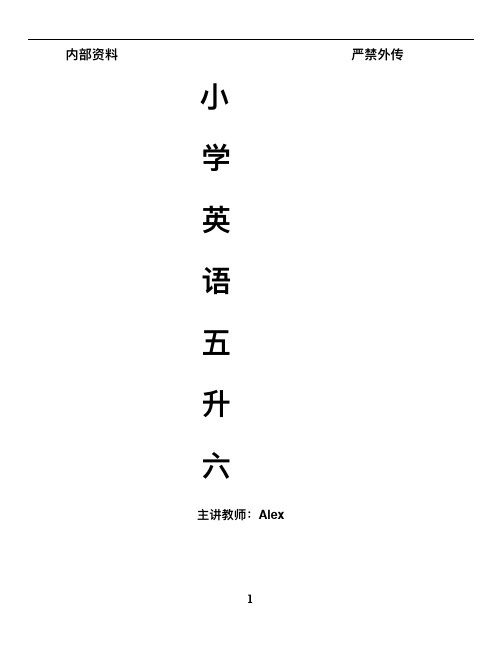
内部资料料严禁外传⼩小学英语五升六主讲教师:Alex五年年级英语下册复习重点(外研版)第⼀一模块:单词短语1. many years ago 许多年年前2. live in a small house 住在⼀一所⼩小房⾥里里3. enough food ⾜足够的⻝⾷食品4. how about 怎么样5. lots of buses and cars许多公共汽⻋车与⼩小汽⻋车6. every day 每天7. talk to 和…交谈8. miss China 想念中国9. four years ago 四年年前10. last night 昨天晚上11. a television programme about China ⼀一个关于中国的电视节⽬目12. talk about 谈论 13. cook on a fire 在炉⽕火上做饭14 work in the fields 在⽥田地⾥里里劳作句句型1、There was(were)+某⼈人或某物+某地2、过去式:We didn’t have enough food .句句型:肯定句句:主语+动词过去式+其他否定句句:主语+be动词过去式+not+其他或主语+did not+动词原形+其他第⼆二模块:短语1. in lots of Chinese cities 在许多中国城市2. foreign language 外语3. learn English 学习英语4. welcome to Beijing 欢迎到北北京来5. make a cake 做蛋糕6. do homework 做家庭作业7. in his class 在他的班级8. a good pupil ⼀一个好学⽣生9. study hard 努⼒力力学习10. an English teacher ⼀一位英语⽼老老师11. walk to school ⾛走路路去学校12. by school bus 乘坐校⻋车句句型1、询问他⼈人做过某事的句句型及回答句句型例例:Did she learn any foreign languages?问:Did+主语+动词原形+其他答:Yes ,⼈人称代词主格+did .或No ,⼈人称代词主格+didn’t .2、描述他⼈人做过某事例例:She learnt English . 主语+动词过去式+其他3、描述他们现在在做某事例例:He is learning English now .主语+be+动词ing+其他第三模块:短语1.have got 拥有2.an e-mail from Linglin⼀一封来⾃自玲玲的电⼦子邮件3.about English food 关于英国⻝⾷食物4.have an English breakfast 吃了了⼀一顿英式早餐5.have …for lunch 吃…作为午餐6.a traditional English dinner ⼀一顿传统的英式晚餐7.very different ⾮非常不不同8.give …to … 把…给…9.at school 在学校10.cook Chinese food for Lingling 为玲玲做中式⻝⾷食物11.be going to 打算12.tell a story 讲故事句句型1、描述吃过某些⻝⾷食物:主语+ had + ⻝⾷食物名称+ 其他2、询问他⼈人打算吃/喝喝什什么:What are you going to eat/drink ?3、询问他⼈人三餐吃了了什什么:What + did + 主语+ have + for breakfast / lunch / dinner ?第四模块:单词短语Library 图书馆; find 找到; CD-ROM 电脑光盘; bring带来; use使⽤用; card 卡⽚片; easy简单的; information信息; timetable时间表; dictionary字典; newspaper 报纸.1. want to 想要2. make an e-card for Mum 为妈妈制作⼀一张电⼦子卡⽚片3. be good at 擅⻓长4. go to the library 去图书馆5. find a book about e-cards 找到⼀一本关于电⼦子卡⽚片的书6. at the library 在图书馆7. the book about computers 关于电脑的书8. on Shelf C 在C架上9. library card 借书卡10. bring back 带回来11. in two weeks’ time 在两周时间内12. use our computer 使⽤用我们的电脑13. be easy with ⽤用……很简单14. find out 找到、找出15. in this dictionary 在这本词典⾥里里16. on this CD-ROM 在这张光盘上17. in this newspaper 在这张报纸上18. at the zoo 在动物园19. on TV 在电视上句句型询问某物在何处及回答的句句型:1、Where are the…about…,please ?2、Where can you find out about …?3、You can find out … in / on …第五模块短语1. take it to China 带它到中国2. buy you a new one 给你买⼀一个新的3. this black bag 这个⿊黑包4. two pockets 两个⼝口袋5. big and light ⼜又⼤大⼜又轻6. be easy for you 对你来说很容易易7. at the department store 在百货商店8. a panda on it 有⼀一个熊猫在上⾯面9. be too…for 对…来说太… 10. take…to… 把…带到…句句型1、描述事物特征的句句型:It’s get… (big反义small; heavy反义light; easy反义hard)2、表达看法:It’s + 形容词+ for +⼈人称代词宾格第六模块短语1. of course 当然2. photos of China 中国的照⽚片3. in the west of China 在中国的⻄西部4. go there 去那⼉儿5. last year 去年年6.go with your mother and father 和你的妈妈、爸爸⼀一起去7. stay with 和…呆在⼀一起8. in July 在七⽉月9. live there 住在那⼉儿10. every year 每年年11. Li people 黎族⼈人12. visit her friend 拜访她的朋友13. ride a horse 骑⻢马14. climb the Tianshan Mountain 爬天⼭山15. visit the Tianchi Lake 参观天池16. have a lovely time 度过⼀一段愉快的时光17. a lot of /lots of 许多句句型1、⼈人称代词和物主代词的区别和⽤用法;2、⽤用⽅方位词表达地点:It’s in the north / south / east / west of….第七模块短语1. send an email 发送电⼦子邮件2. a computer message 电脑信息3. from…to … 从…..到…..4. a good idea ⼀一个好主意5. an idea ⼀一个主意6. click on 点击7. write your message 写你的信息8. at work 在⼯工作9. an email from little Tom ⼀一封来⾃自⼩小Tom的电⼦子邮件10. make a poster 制作海海报 11. thank you for… 为……⽽而感谢12. work hard 努⼒力力⼯工作13. at the office 在办公室14. be busy 忙碌的15. be home 在家16. at seven o’clock 在七点钟17. on the train 在⽕火⻋车上18. stand up 起⽴立19. run to the blackboard 跑向⿊黑板20. on the blackboard 在⿊黑板上句句型1、another和the other : another⽤用于三者以上的“其中⼀一个”,the other⽤用于两者之间2、英语时间的表达:①10:00 ten o’clock ②1:58 one fifty-eight③7:10 ten past seven ④9:48 twelve to ten⑤4:45 a quarter to five ⑥9:30 half past nine第⼋八模块短语1. come quickly 快来2. on the phone 在通话中3. be excited 激动的4. in the summer 在这个夏天5. take a present for my cousin 为我的堂弟带⼀一份礼物6. a Chinese dragon kite ⼀一个中国⻰龙的⻛风筝7. the same as 与…..相同8. I think so ./I don’t think so. 我认为这样./我认为不不这样9. go to a party 去参加聚会10. wear a beautiful dress 穿着漂亮的⾐衣服句句型1、表示建议的⼏几种⽅方法:(1)What about …. ? ……怎么样?(2)Why don’t you … ? 你为什什么不不……呢?(3)How about … ? ……怎么样?2、形容词⽐比较级的构成:第九模块短语1. in English ⽤用英语2. last week 上周3. go to a children’s theatre 去⼉儿童剧院4. wear women’s clothes 穿⼥女女⼈人的⾐衣服5. wear men’s clothes 穿男⼈人的⾐衣服6. tell jokes/ tell a joke 说笑话7. laugh a lot ⼤大笑,笑个不不停8. after the show 表演之后9. go to a restaurant 去餐馆10. be ready for….. 为……做好了了准备11. your trip to America 你去美国的旅⾏行行12. last night 昨天晚上13. in three weeks /in three weeks’ time 在3个周的时间内14. buy …for… 为……买……15. a book about Chinese history ⼀一本关于中国历史的书16. ask you some questions 问你⼀一些问题17. borrow a bike for you 为你借⼀一辆⾃自⾏行行⻋车18. CDs of Chinese songs 中国歌曲的光盘19. listen to 听20. in the evenings 在晚上21. See you soon. 再⻅见句句型描述某⼈人过去、现在、将来做某事:1、主语+ 动词过去式+ 其他2、主语+ be + 动词ing + 其他3、主语+ be going to + 其他第⼗十模块短语1. feel nervous 感到紧张2. make a list of things to do 列列⼀一个要做的事情的清单3. go to the airport 去⻜飞机场4. this weekend 这个周末5. go there 去那⼉儿6. at the airport 在⻜飞机场7. in a yellow taxi 乘⼀一辆⻩黄⾊色的出租⻋车8. tall buildings ⾼高楼9. speak English/Chinese 说英语/汉语10. make Chinese food for me为我制作中国的⻝⾷食物句句型“will + 动词原形”表示将来的动作或状态,构成⼀一般将来时态。
【提优拔尖】小学英语五升六暑假讲义专题一 ---- 感叹句what、how的用法

暑期专题一----- 感叹句what/how以及How引导的特殊疑问句一、由"what"引导的感叹句用法:"what"意为"多么"用作定语,修饰名词(被强调部分),单数可数名词前要加不定冠词a/an,复数可数名词或不可数名词前不用冠词。
结构:A. what + (a/an) + adj. + n. + 主语+ 谓语! What a clever girl she is! 多么聪明的姑娘呀!B. what + adj.+ n.复数+ 主语+ 谓语! What interesting stories they are! 多么有趣的故事呀!C. what + adj.+ n.不可数+ 主语+ 谓语! What good news it is! 多么好的消息!二、由"how"引导的感叹句用法:"how"意为"多么",用作状语,修饰形容词或副词(被强调部分)。
如果修饰形容词,则句中的谓语动词用系动词; 如果how修饰副词,则句中的谓语动词用行为动词。
结构:How + adj.(adv.) + 主语+ 谓语!. How cold it is today! 今天多么冷呀!三、陈述句变感叹句口诀:一断,二去,三加,四换位,五感叹号。
一断:即在谓语动词后断开,使句子分为两部分。
如:He is / a very clever man .二去:即去掉very, too, much, quite等修饰语。
如:He is / a clever man .三加:即第二部分若是副词、形容词,就加上how;若是一个名词,就加上what。
如:He is / what a clever man .四换位:即将断开的第一部分和第二部分位置互换。
如:What a clever man he is .五感叹号:即句子末尾别忘了加上感叹号。
五升六英语短期语法专题

五升六语法专辑英语基础语法课程练习册1. 语法:一般现在时Warming-up表示经常的,习惯性的动作,常与表示频率的时间副词连用。
1. 表示经常性或习惯性的动作:I get up at six every day.2. 表示事物和人物的特征.状态:The sky is blue.3. 表示客观事实:The earth goes around the sun.关键词:day once, twice, three timesyear four times a weekmonth on Saturdaysevery week on Sundaysmorningafternoonevening句型:1. be 动词的变化肯定式:He is a teacher.否定式:He is not a teacher.一般疑问句:Is he a teacher? -Yes, he is. / No, he isn't.特殊疑问句:What is he?2. 行为动词的变化肯定式:I like pork. 第三人称单数:He likes pork.否定式:I don't like pork. 第三人称单数:He doesn't like pork.一般疑问句:Do you like pork? 第三人称单数:Does he like pork?-Yes, I do. / No, I don't. –Yes, he does. / No, he doesn't.特殊疑问句:What do you like? / What does he like?课堂巩固一. 将下列动词改为第三人称单数形式。
Model: do→ does1. fly _______2. skip _______3. play _______4. wash _______5. go _______6. watch _______7. study _______8. swim _______9. skate _______二. 用所给动词的适当形式填空。
【提优拔尖】小学英语五升六暑假讲义:专题八----六年级上册Unit3新课讲义译林版三起
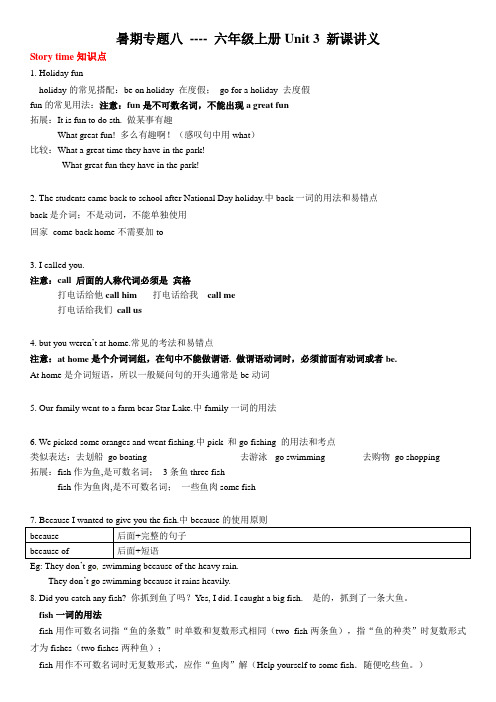
暑期专题八---- 六年级上册Unit 3 新课讲义Story time知识点1. Holiday funholiday的常见搭配:be on holiday 在度假;go for a holiday 去度假fun的常见用法:注意:fun是不可数名词,不能出现a great fun拓展:It is fun to do sth. 做某事有趣What great fun! 多么有趣啊!(感叹句中用what)比较:What a great time they have in the park!What great fun they have in the park!2. The students came back to school after National Day holiday.中back一词的用法和易错点back是介词;不是动词,不能单独使用回家come back home不需要加to3. I called you.注意:call 后面的人称代词必须是宾格打电话给他call him打电话给我call me打电话给我们call us4. but you weren’t at home.常见的考法和易错点注意:at home是个介词词组,在句中不能做谓语. 做谓语动词时,必须前面有动词或者be.At home是介词短语,所以一般疑问句的开头通常是be动词5. Our family went to a farm bear Star Lake.中family一词的用法6. We picked some oranges and went fishing.中pick 和go fishing 的用法和考点类似表达:去划船go boating 去游泳 go swimming 去购物go shopping拓展:fish作为鱼,是可数名词;3条鱼three fishfish作为鱼肉,是不可数名词;一些鱼肉some fish7. Because I wanted to give you the fish.中because的使用原则because 后面+完整的句子because of 后面+短语Eg: They don’t go swimming because of the heavy rain.They don’t go swimming because it rains heavily.8. Did you catch any fish? 你抓到鱼了吗?Yes, I did. I caught a big fish. 是的,抓到了一条大鱼。
小学五升六 英语讲义
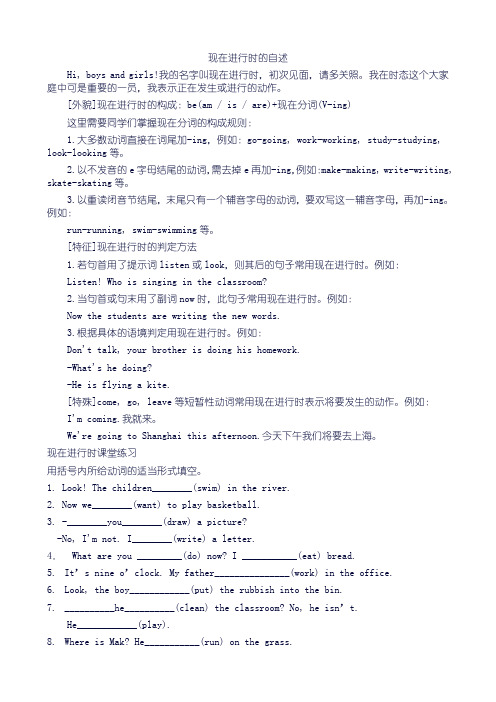
现在进行时的自述Hi, boys and girls!我的名字叫现在进行时,初次见面,请多关照。
我在时态这个大家庭中可是重要的一员,我表示正在发生或进行的动作。
[外貌]现在进行时的构成:be(am / is / are)+现在分词(V-ing)这里需要同学们掌握现在分词的构成规则:1.大多数动词直接在词尾加-ing,例如:go-going, work-working, study-studying, look-looking等。
2.以不发音的e字母结尾的动词,需去掉e再加-ing,例如:make-making, write-writing, skate-skating等。
3.以重读闭音节结尾,末尾只有一个辅音字母的动词,要双写这一辅音字母,再加-ing。
例如:run-running, swim-swimming等。
[特征]现在进行时的判定方法1.若句首用了提示词listen或look,则其后的句子常用现在进行时。
例如:Listen! Who is singing in the classroom?2.当句首或句末用了副词now时,此句子常用现在进行时。
例如:Now the students are writing the new words.3.根据具体的语境判定用现在进行时。
例如:Don't talk, your brother is doing his homework.-What's he doing?-He is flying a kite.[特殊]come, go, leave等短暂性动词常用现在进行时表示将要发生的动作。
例如:I'm coming.我就来。
We're going to Shanghai this afternoon.今天下午我们将要去上海。
现在进行时课堂练习用括号内所给动词的适当形式填空。
1. Look! The children________(swim) in the river.2. Now we________(want) to play basketball.3. -________you________(draw) a picture?-No, I'm not. I________(write) a letter.4.What are you _________(do) now? I ___________(eat) bread.5.It’s nine o’clock. My father_______________(work) in the office.6.Look, the boy____________(put) the rubbish into the bin.7.__________he__________(clean) the classroom? No, he isn’t.He____________(play).8.Where is Mak? He___________(run) on the grass.9.Listen, who____________(sing) in the music room? Oh,Mary_____________(sing) there.将下列句子改成现在进行时1. Tom can speak Chinese.2. We have four lessons.3. I watch TV every day.4. She works in a hospital.5. Do you like this book?6. Kitty and Ben have lunch at about twelve.7. His father can help them.8. Danny, open the door.9. They watch TV in the evening.现在进行时课后练习一、选择填空:( )1. Look! LiPing and Li Ying ________ basketball now.A. playB. playsC. are playing( )2. Can I______ this book?A. haveB. hasC. having( )3. I to music at 7:00 this morning.A. listenB. listeningC. listens( )4. What ______ that in the box? A shirt.A. amB. isC. areD. be( )5. Can I TV? Sure.A. watchingB. watchC. see( )6、She like swimming.A. doesn'tB. don'tC. isn't.( )7. Here the money.A. areB. isC. am( )8. There _______ a table and two chairs in Jenny’s room.A. amB. isC. are二、用动词的适当形式填空。
五升六英语
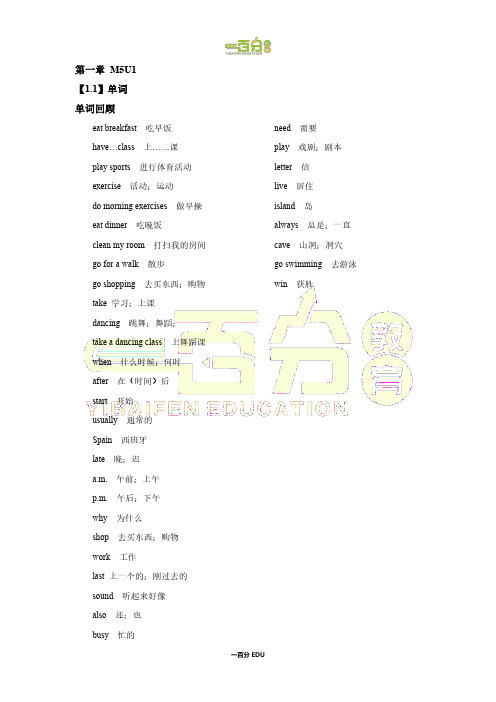
need 需要 play 戏剧;剧本 letter 信 live 居住 island 岛 always 总是;一直 cave 山洞;洞穴 go swimming 去游泳 win 获胜
一百分 EDU
Activities(活动) get up 起床 do morning exercises 晨练 have English class 上英语课 play sports 进行体育活动 play the piano 弹钢琴 go shopping 购物 go hiking 去远足 eat breakfast 吃早饭 eat dinner 吃晚饭
8 上舞蹈课____________
一百分 EDU
9 去散步____________ 11 起床________________ 13 打乒乓球________________ 15 做家庭作业________________
10 吃做饭________________ 12 在周末________________ 14 go swimming________________
△句型: ①询问做某事在几点 When do you+动词原形(短语)+其他? ——° At +时间 ——° I(+频度副词)+动词原形(短语)+at+时间。 例句:When do you get up in the morning? ——° At 7:30. ——° I often get up at 7:30. ②询问周末的活动安排
dinner. Shopkeeper: You’re so busy! You need a robit to help you! 5 、Let me see. From Monday to Wednesday, I usually collect nuts in the afternoon.
小学五升六年级英语知识 50个常用口语,暑假背诵
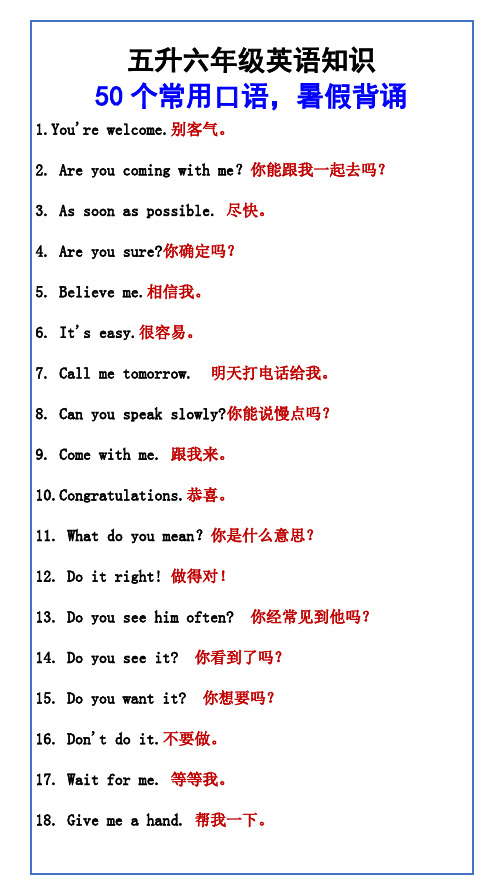
1.You're welcome.别客气。
2. Are you coming with me?你能跟我一起去吗?3. As soon as possible. 尽快。
4. Are you sure?你确定吗?5. Believe me.相信我。
6. It's easy.很容易。
7. Call me tomorrow. 明天打电话给我。
8. Can you speak slowly?你能说慢点吗?9. Come with me. 跟我来。
10.Congratulations.恭喜。
11. What do you mean?你是什么意思?12. Do it right! 做得对!13. Do you see him often? 你经常见到他吗?14. Do you see it? 你看到了吗?15. Do you want it? 你想要吗?16. Don't do it.不要做。
17. Wait for me. 等等我。
18. Give me a hand.帮我一下。
19. Where are you going?你去哪里?20. That’s right. 对了。
21. Tell me.告诉我。
22. Have you finished?你做完了吗?23. That happens. 会发生,碰巧,恰巧。
24. I'm ready. 我准备好了。
25. Let me see.让我想想。
26. How long are you staying?你要待多久?27. I think so. 我认为是这样的。
28. It's nothing.没什么。
29. I can do it.我能做。
30. I can't believe it.我简直不能相信。
31. I'm hungry. 我饿了。
32. I don't know anybody.我一个人都不认识。
五升六英语复习和延伸
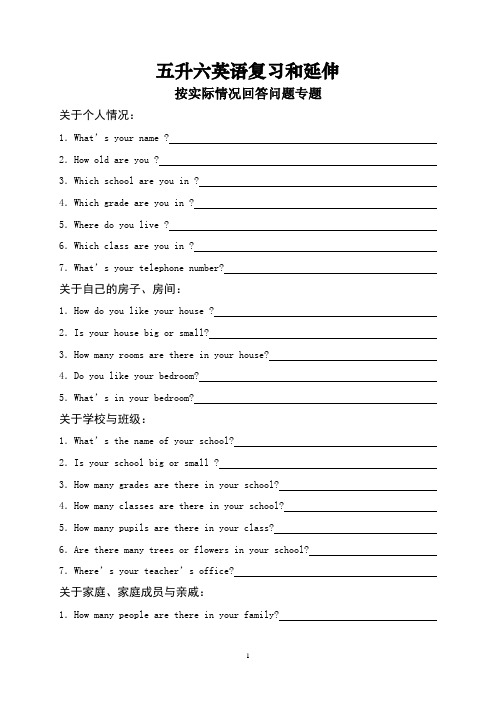
五升六英语复习和延伸按实际情况回答问题专题关于个人情况:1.What’s your name ? 2.How old are you ? 3.Which school are you in ? 4.Which grade are you in ? 5.Where do you live ? 6.Which class are you in ? 7.What’s your telephone number? 关于自己的房子、房间:1.How do you like your house ? 2.Is your house big or small? 3.How many rooms are there in your house? 4.Do you like your bedroom? 5.What’s in your bedroom? 关于学校与班级:1.What’s the name of your school? 2.Is your school big or small ? 3.How many grades are there in your school? 4.How many classes are there in your school? 5.How many pupils are there in your class? 6.Are there many trees or flowers in your school? 7.Where’s your teacher’s office? 关于家庭、家庭成员与亲戚:1.How many people are there in your family?2.What’s your father’s job? 3.What’s your mother’s job?4 Do you have any brothers or sisters?5.Are you the only child in your famlily?6.Do you have a cousin ?7.Is your father tall?8.Does your mother have long hair?关于时间、日期:1.What time is it now ?2.What day is it today?3.How many days are there in a week?4.What are they?5.How many days are there in a year?6.How many hours are there in a day?7.Is today your birthday?关于数字:1.What’s twelve and twenty?2.How much is zero and ten? 3.What’s two plus(加)forty?4.Is fifty-five plus forty-five one hundred?5.How much is your bag?关于服装:1.What colour is your coat?2.Does your your mother have any sweaters? 3.Do you wear sport shoes?4.Does your sister like new clothes?5.Do you like T-shirt or white T-shirt? 关于动物:1.Do you often go to the zoo? 2.What animals are there in the zoo? 3.What’s your favourite animal? 4.Do you like rabbits? 5.What colour is a panda? 关于食品和饮料:1.What’s your favourite food ? 2.What drink do you like ? 3.Do you like drinking apple juice or orange juice? 4.How do you like fish? 5.What do you usually have for breakfast? 关于日常生活:1.What do you usually do on Sunday and Saturday? 2.What time do you get up every day? 3.Do you go to the park with your parents? 4.What time do you go home in the afternoon? 5.What do you usually do after school? 6.Do you watch TV in the evening? 7.Do you go to bed late every day? 关于学校:1.What time do you get to school? 2.How many lessons have you got one day ? 3.Do you study Japanese at school ? 4.What subjects are you studying ?5.Do you often play games or sing songs in English classes? 6.What’s your favourite subject? 7.Who’s your English teacher? Do you like her? 关于体育运动:1.What’s your favourite sport? 2.Do you take exercise every day ? 3.Do you have sports after school? 4.Do you like swimming? 5.Who’s your favourit sport star? 6.Please tell me something about Yaoming. 关于兴趣与爱好:1.What’s your hobby ? 2.Are you good at playing the piano? 3.Does your father like fishing ? 4.Do you like shopping with your mother? 5.Does your English teacher like watching football? 关于能力:1.Can you sing and dance well?2.Can your father drive a car?3.Can you make kites?4.Can your family speak Chinese?同步练习一、按实际回答:1.Did you get up early yesterday morning?___________________2. What time did you have breakfast yesterday morning?__________________3.How did you go to school yesterday morning?_________________________4.How many lessons did you have yesterday?____________________________5. where did you have lunch yesterday?______________________6. Did you have sports yesterday?__________________________7. what did yiu do after dinner yesterday evening?______________________________________________________8. When did you go to bed last night?________________________9.Is your classroom the largest one in your school?____________________10.Is your school the largest in your city?__________________11.Is your bedroom larger than the living- room?_______________________12.Is your classroom the most comfortable in your school?__________________________________________________13. Did you clean classroom yesterday?____________________14. Is there a library in your school?_______________________15.Who’s your hero and who’s your heroine?__________________________________________________16.Did you read a book about Robin Hood?___________________17. Did you see a film about Sun Yatsen?_____________________18. Do you want to be a great leader when you grow up?______________________________________________________19.Do you want to be famous?_____________________________20. Can you name some famous leaders in the world?_____________________21.When were you born?_________________________22. Where were you born?________________________________________23. Are you the only child in your family?______________________________24. Who is the oldest in your family?_________________________________25. Did your father live in another city before?________________________26. What is your father’s job?______________________________27. Do you love Guangzhou?______________________________二、选择:( )1. Welcome_______my garden.A: on B: in C: to( )2.The baby was always ____trouble.A: on B: in C: at( )3. ___the lady angry when someone picked her flowers?A: Was B: Is C Will be( )5. I hope the young trees will grow______.A:well B: nice C: good( )6. The ____ of the trees turn yellow in autumn.A: leaf B: leave C: leaves。
小学英语五升六暑假讲义专题七----六年级上册Unit2新课讲义译林版三起
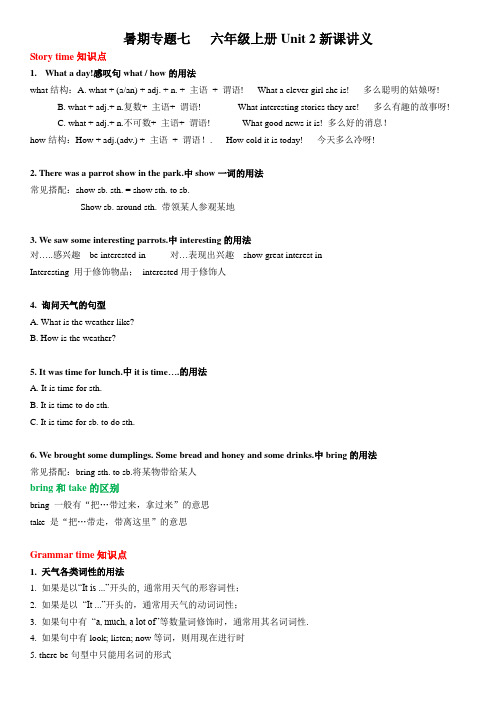
暑期专题七六年级上册Unit 2新课讲义Story time知识点1.What a day!感叹句what / how的用法what结构:A. what + (a/an) + adj. + n. + 主语+ 谓语! What a clever girl she is! 多么聪明的姑娘呀!B. what + adj.+ n.复数+ 主语+ 谓语! What interesting stories they are! 多么有趣的故事呀!C. what + adj.+ n.不可数+ 主语+ 谓语! What good news it is! 多么好的消息!how结构:How + adj.(adv.) + 主语+ 谓语!. How cold it is today! 今天多么冷呀!2. There was a parrot show in the park.中show一词的用法常见搭配:show sb. sth. = show sth. to sb.Show sb. around sth. 带领某人参观某地3. We saw some interesting parrots.中interesting的用法对…..感兴趣be interested in 对…表现出兴趣show great interest inInteresting 用于修饰物品;interested用于修饰人4. 询问天气的句型A. What is the weather like?B. How is the weather?5. It was time for lunch.中it is time….的用法A. It is time for sth.B. It is time to do sth.C. It is time for sb. to do sth.6. We brought some dumplings. Some bread and honey and some drinks.中bring的用法常见搭配:bring sth. to sb.将某物带给某人bring和take的区别bring 一般有“把…带过来,拿过来”的意思take 是“把…带走,带离这里”的意思Grammar time知识点1. 天气各类词性的用法1. 如果是以“It is ...”开头的, 通常用天气的形容词性;2. 如果是以“It ...”开头的,通常用天气的动词词性;3. 如果句中有“a, much, a lot of”等数量词修饰时,通常用其名词词性.4. 如果句中有look; listen; now等词,则用现在进行时5. there be句型中只能用名词的形式2.常见的动词过去式不规则变化总结am was 是(表示存在、状态等)are were 是(表示存在、状态等)bee became 成为;变成begin began 开始break broke 打破bring brought 拿来;取来;带来build built 构筑;建造;建筑buy bought 购买;买can could 可以;能;可能;会catch caught 赶上(车船等);捕获e came 来;来到cut cut 切;割;削;剪do/does did 做;干;行动draw drew 画drink drank 喝;饮drive drove 开车;驾驶eat ate 吃feel felt 感到;觉得find found 寻找;查找fly flew 飞行forget forgot 忘记;忘却get got 变得give gave 给;授予go went 去have/has had 得(病);患(病);有;吃;饮hear heard 听见;听说hide hid 隐藏keep kept 保持;使保持某种状态know knew 知道;了解Sound time知识点ear发音Near; hear……bear wear pearEarly learn earthheartCartoon time和checkout time知识点1. What’s the matter? 的用法同义句:What’s wrong with sb? 或者What happens to sb.?2. I lost my new bike.中lost的用法lost原型:lose 过去式:lost 形容词:lost常见搭配:迷路lose one’s way / be lost3. Sam wants to know why. 中想要做某事的表达方式A. want to do sth.B. would like to do sth.4. but it flew too high.中too + 形容词的用法too + adj.的常见搭配:太……而不能做某事be too adj. to do sth.5. It was windy on Monday morning. / I got up at 7 o’clock.中介词on; at的用法时间介词on / at / in的用法6. I went to school by bus/car/bike.中交通方式的表达骑自行车去公园ride a bike to the park go to the park by bike乘轿车去公园take a car to the park go to the park by car步行去公园walk to the park go to the park on foot乘公交车去公园take a bus to the park go to the park by bus拓展:by bus = on a bus by car = in a carby bike = on a bike by plane = on a plane注意:by bus表示介词短语不可能在句中作谓语动词Unit 2 What a day!短语总结重点词组1. What a day!多么……的一天!2. on 20th September 在9月20日3. in the morning 在上午4. a parrot show 鹦鹉展览5. go to the park by bike 骑自行车去公园6. some interesting parrots 一些有趣的鹦鹉7. bee windy and cloudy 变得有风和多云8. fly ki tes 放风筝9. high in the sky 高高地在天空中10. It’s time for lunch. 午饭的时间到了。
五升六英语知识要点

一、问职业:What be + 主语?= What does /do +主语+do?eg. He is a teacher.(提问)_____? _____ he _____?二、表方式的短语1)on foot 2)by + 交通名词单数(无冠词)= in / on a (the; 物主代词;名词所有格)eg. 1、by bike = on a bike? by car = in a car?2、He goes to work by a bike every day.(改错)? _____________三、区别:have to : 有外部条件强加的客观上的“不得不” (存在各种时态)must: 个人主观上认为“必须”(无时态变化)eg. 1、I ___ stop on the way because of the rain.2、I ____ stop because I’m a little tired.四、提建议1、Shall we… ?? 答肯定:Good idea / OK /2、Let’s …???? All right3、Why not… ?? 语否定:No, let’s…? 肯定:Certainly/ Yes, please/另还可回答为Yes, I think so/ I’d love to否定:No,I don’t think so /I’m afraid not.五、put on强调“穿”的动作:穿上,戴上后接wear是put on 之后的结果:穿着? ? “衣服”= be in??? 名词dress sb: 给某人穿衣eg. 1、You’d better ____ more clothes when you go out. It’s cold outside.A. wear ?B. dress? ?C. put on?D. take off? ?2、The boy can _____ himself now. A. wear ? B. dress? C. put on? D. take off ? 3、Tom is wearing a red shirt today.六、在具体的某楼前用oneg. He lives on the fifteenth floor.△七、How do you like… ? 你觉得……怎么样?= What do you think of … ?eg. How do you like the new film? = What do you think of the new film? 你觉得这部新电影怎么样?八、a little = a bit 但注意:1) a little+名词= a bit of + 名词)eg.There is a little( a bit of ) water in the glass.九、? marry sb = be married to sb.与某人结婚? get married = be married 已婚;结婚(但get married是“短命”动词,要指“结婚多久”应用be married)eg. 1、She married with a doctor (找错) ______? 2、She has got married for ten years (找错) __________十、leave sth + 地点:把某物忘在某地? forget sth : 忘记某事eg. 1)He ______ the driver’s license yesterday.? 2)I ____ my umbrella in the train just now.十一、感叹句1、What (a, an) + 形+ 名(+主+ 谓)!(注:但名词为不可数、复数时,则不用a / an)2、How + 形/ 副(+ 主+ 谓)!eg.1)________ bad weather!2)______ hard they are working!? 3)______ good girl she is! 4)_____ beautiful flowers they are!十二、“雨大,雪大”heavy---heavily/ hard “风大” strong ---strongly?△18.so 句型? ? so + be(助、情) + 主语:“也如此”? ? so + 主语+ be(助、情):“的确如此”Eg.1、I watched TV last night, and so did she. 昨晚我看了电视,她也看了。
升六年级英语知识点

升六年级英语知识点初中六年级是英语学习中的一个重要阶段,学生需要建立扎实的英语基础,并且进一步扩展词汇量和语法知识。
以下是升六年级英语需要掌握的知识点。
一、词汇1. 日常生活词汇:包括食物、动物、人物、物品等常见事物的英文表达,如apple(苹果)、cat(猫)、teacher(老师)等。
2. 学科词汇:学生需要学习和掌握与其他学科相关的词汇,如math(数学)、science(科学)等。
3. 动词词组:学习一些常用的动词词组,如go to school(去上学)、have breakfast(吃早餐)等。
4. 形容词和副词:学生需要学会用形容词和副词来描述事物的特征和状态,如beautiful(漂亮的)、quickly(快速地)等。
二、语法1. 时态:学生需要掌握基本的时态形式,包括一般现在时、一般过去时和一般将来时等。
2. 代词:学习和使用一些基本的代词,如I(我)、he(他)等,并学会在句子中正确使用它们。
3. 名词:学生需要了解和使用单数和复数形式的名词,并学习名词所有格的构成方法。
4. 介词:学生需要学会使用一些常见的介词,如in(在)、on (在……上)等,并掌握它们在句子中的正确用法。
三、句型1. 简单句:学生需要学习和运用一些简单句,包括主语+谓语结构和主语+谓语+宾语结构等。
例句:- I like apples.(我喜欢苹果。
)- They are playing soccer.(他们正在踢足球。
)2. 疑问句:学生需要学会构成疑问句,并能正确使用各种疑问词。
例句:- What is your name?(你叫什么名字?)- Where is the park?(公园在哪里?)3. 肯定和否定句:学生需要学会构成肯定句和否定句,并理解它们的用法。
例句:- She can swim.(她会游泳。
)- I don't like vegetables.(我不喜欢蔬菜。
)四、阅读理解学生需要提高阅读理解能力,包括理解文章的主旨和细节信息,根据文章内容回答问题,以及根据上下文理解词语的意思等。
- 1、下载文档前请自行甄别文档内容的完整性,平台不提供额外的编辑、内容补充、找答案等附加服务。
- 2、"仅部分预览"的文档,不可在线预览部分如存在完整性等问题,可反馈申请退款(可完整预览的文档不适用该条件!)。
- 3、如文档侵犯您的权益,请联系客服反馈,我们会尽快为您处理(人工客服工作时间:9:00-18:30)。
一、问职业:
What be + 主语?= What does /do +主语+do?
eg. He is a teacher.(提问)_____ _____ he _____?
二、表方式的短语
1)on foot 2)by + 交通名词单数(无冠词)= in / on a (the; 物主代词;名词所有格)
eg. 1、by bike = on a bike by car = in a car
2、He goes to work by a bike every day.(改错) _____________
三、区别:have to : 有外部条件强加的客观上的“不得不” (存在各种时态)
must: 个人主观上认为“必须”(无时态变化)
eg. 1、I ___ stop on the way because of the rain.
2、I ____ stop because I’m a little tired.
四、提建议
1、Shall we… ?答肯定:Good idea / OK /
2、Let’s …All right
3、Why not… ?语否定:No, let’s…肯定:Certainly/ Yes, please/
另还可回答为Yes, I think so/ I’d love to否定:No,I don’t think so /I’m afraid not.
五、put on强调“穿”的动作:穿上,戴上后接
wear是put on 之后的结果:穿着“衣服”= be in 名词
dress sb: 给某人穿衣
eg. 1、You’d better ____ more clothes when you go out. It’s cold outside.
A. wear
B. dress
C. put on
D. take off
2、The boy can _____ himself now. A. wear B. dress C. put on D. take off
3、Tom is wearing a red shirt today.
六、在具体的某楼前用on
eg. He lives on the fifteenth floor.
△七、How do you like… ? 你觉得……怎么样?= What do you think of … ?
eg. How do you like the new film? = What do you think of the new film? 你觉得这部新电影怎么样?
八、a little = a bit 但注意:1) a little+名词= a bit of + 名词)
eg.There is a little( a bit of ) water in the glass.
九、marry sb = be married to sb.与某人结婚get married = be married 已婚;结婚
(但get married是“短命”动词,要指“结婚多久”应用be married)
eg. 1、She married with a doctor (找错) ______
2、She has got married for ten years (找错) __________
十、leave sth + 地点:把某物忘在某地
forget sth : 忘记某事
eg. 1)He ______ the driver’s license yesterday.
2)I ____ my umbrella in the train just now.
十一、感叹句
1、What (a, an) + 形+ 名(+主+ 谓)!(注:但名词为不可数、复数时,则不用a / an)
2、How + 形/ 副(+ 主+ 谓)!
eg.1)________ bad weather!2)______ hard they are working!
3)______ good girl she is! 4)_____ beautiful flowers they are!
十二、“雨大,雪大”heavy---heavily/ hard “风大” strong ---strongly
△18.so 句型
so + be(助、情) + 主语:“也如此”
so + 主语+ be(助、情):“的确如此”
Eg.1、I watched TV last night, and so did she. 昨晚我看了电视,她也看了。
2、I watch TV every day, and so does he. 我每天看电视,他也如此。
3、I can swim, so I can. 我会游泳,真的是这样。
十三、problem与question
question: 指人们主观上产生而提出等待回答的问题。
常与ask , answer连用
problem: 指客观上存在等待解决的问题着重指“难题”。
常与solve , work out连用
1) We must find out a good way to solve the ______.
2) You can answer the _____ in your own words.
十四、borrow: 借进borrow … from从…借
36. lend: 借出lend sb sth = lend sth to sb 把某物借给某人
△48.计量:表事物的“长、宽、高、深、远、厚”用“long ; wide ; high / tall ; deep ; away ; thick.
1)Mr Green is nearly two metres ________
2)The ice is about one metre _________.
3)Our classroom is about twelve metres ______and eight metres __________.。
